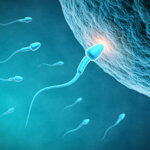We all know how important it is, for the well-being of an unborn baby’s health, that a pregnant woman takes good care of herself. This usually means a balanced diet, just the right amount of physical activity (not too little, not too much), and complete abstinence from drinking, smoking, and other hazardous habits.
It is a proven fact that a mother’s lifestyle can affect the health of the baby’s health
This is only logical since the baby and the mother are connected through the umbilical cord.
But what about the father? This is a rarely asked question. Men who are about to become fathers do not usually abstain from anything. Their lifestyle and habits are not affected by the baby’s well-being.
It is a common opinion that only the mother’s overall condition plays an important role in fetal development. This is wrong. Even though the mother’s influence is stronger and more direct, the fathers’ health is also significant.
The future father’s sperm quality is very important for a baby’s health
Not only for conception but also for the proper development of the fetus and the health of the newborn baby.
New studies reveal that the quality of a man’s sperm can affect the health of a newborn, but also the health of most male descendants, for up to three generations.
How does it work?

Male infertility is increasingly being attributed to the effects of chemicals found in foods, personal care products, and plastics as well as to smoking and alcohol consumption. The modern diet, poor in nutrients, rich in simple carbs, and full of empty calories is also not helping.
Sperm plays a very important role in conception
For example, it plays a crucial part in the formation of the placenta. Low sperm quality is also associated with an increased risk of miscarriage. The sperm is also responsible for the transfer of the so-called “biological memories” which cause abnormalities in fetal development.
The Effects of Environmental Factors
Many environmental factors harm the quality of sperm. The most important ones are:
- Stress
- Smoking
- Alcohol consumption
- Poor nutrition
- Exposure to toxins
Scientists believe that these factors can cause changes in the expression of genes. These changes are known as epigenetic modifications.
Through the process of transgenerational epigenetic inheritance, these modifications can reach future generations.
Some studies show that such changes, when passed through sperm, can affect 90% of male descendants up to three generations in the future.
This goes to show how important are the father’s lifestyle, age, habits and overall health for the proper development of the fetus.
We know that, for example, sperm of older men suffer changes in epigenetic patterns. These modifications influence their fertility.
They also affect the baby’s health

Another major concern is alcohol consumption because it is proven to affect cognitive development, birth weight, immune system development, and insulin sensitivity in newborn children.
The Bottom Line
Imagine cooking a dish or making something using two or more different ingredients or materials. If you want your final product to be of the highest quality, you need all the ingredients to be high-quality too. The case is similar with babies. They are made using genetic material from both parents. Therefore, it is not enough if only mothers take care of themselves, fathers need to step up also.





